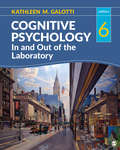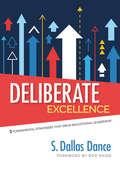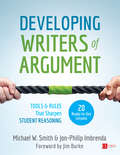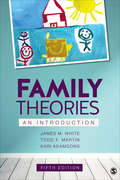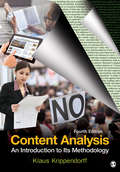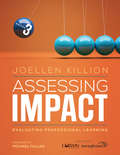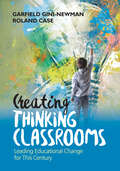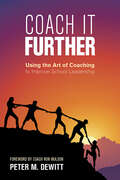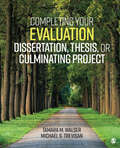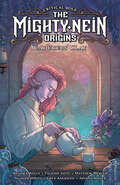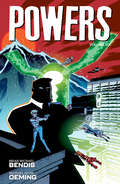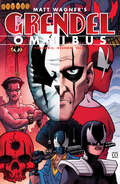- Table View
- List View
Cognitive Psychology In and Out of the Laboratory
by Kathleen M. GalottiCognitive Psychology In and Out of the Laboratory presents balanced, up-to-date coverage of cognitive psychology and shows readers that research conducted in the lab truly does impact the real world. Using her signature, accessible writing style, author Kathleen M. Galotti masterfully connects cognitive psychology to students′ everyday lives through current, relevant examples. The Sixth Edition has been updated to reflect the rapidly changing field of cognitive psychology with new references, streamlined content that gives more attention to key topics like memory, and material on advances in research that enhance our understanding of how people acquire and use information. Interactive eBook also available—bundle it with the new edition! Your students save when you bundle the new edition with the interactive eBook version. Order using bundle ISBN 978-1-5063-9877-8. /p>
Cognitive Psychology In and Out of the Laboratory
by Kathleen M. GalottiCognitive Psychology In and Out of the Laboratory presents balanced, up-to-date coverage of cognitive psychology and shows readers that research conducted in the lab truly does impact the real world. Using her signature, accessible writing style, author Kathleen M. Galotti masterfully connects cognitive psychology to students′ everyday lives through current, relevant examples. The Sixth Edition has been updated to reflect the rapidly changing field of cognitive psychology with new references, streamlined content that gives more attention to key topics like memory, and material on advances in research that enhance our understanding of how people acquire and use information. Interactive eBook also available—bundle it with the new edition! Your students save when you bundle the new edition with the interactive eBook version. Order using bundle ISBN 978-1-5063-9877-8. /p>
Deliberate Excellence: Three Fundamental Strategies That Drive Educational Leadership
by S. Dallas DanceLeadership isn’t just a title What could you do with a $1 billion budget if you had 100,000+ students and one of the largest school systems in America? Imagining is his reality. Learn along from Dallas Dance as he shares the successful change efforts he employed to transform Baltimore Public Schools. Deliberate Excellence is a true story of success in a challenging school environment that delivers great insight and inspiration. Readers will be moved and changed by three key success principles: Establishing equity over equality by providing exactly what individuals need to be successful Understanding change, how it happens, and what one needs to make it so Knowing people deeply and how that leads to accomplishment and organizational change Be inspired by this passion for progress and the drive to maximize latent potential in all people. "For 20 years, Dr. Dallas Dance has been an inspiration to me as a leader. He understands that true leaders inspire others to lead, galvanize their audience, and provide practical applications to difficult situations. Regardless of the political climate, Dr. Dance has always kept students first. After reading Deliberate Excellence, educators will take away successful strategies to increase student achievement." Dr. John B. Gordon III, Chief of Schools Chesterfield County Public Schools, Chesterfield, VA "Leaders are desperate for books that offer techniques from educational leaders who still practice and hone their craft from the trenches and a proven record of success. Dallas Dance offers educational leaders a unique, candid, and welcome perspective." LaQuita Outlaw, Principal – Grades 6-8 Bay Shore Middle School, Bay Shore, NY
Deliberate Excellence: Three Fundamental Strategies That Drive Educational Leadership
by S. Dallas DanceLeadership isn’t just a title What could you do with a $1 billion budget if you had 100,000+ students and one of the largest school systems in America? Imagining is his reality. Learn along from Dallas Dance as he shares the successful change efforts he employed to transform Baltimore Public Schools. Deliberate Excellence is a true story of success in a challenging school environment that delivers great insight and inspiration. Readers will be moved and changed by three key success principles: Establishing equity over equality by providing exactly what individuals need to be successful Understanding change, how it happens, and what one needs to make it so Knowing people deeply and how that leads to accomplishment and organizational change Be inspired by this passion for progress and the drive to maximize latent potential in all people. "For 20 years, Dr. Dallas Dance has been an inspiration to me as a leader. He understands that true leaders inspire others to lead, galvanize their audience, and provide practical applications to difficult situations. Regardless of the political climate, Dr. Dance has always kept students first. After reading Deliberate Excellence, educators will take away successful strategies to increase student achievement." Dr. John B. Gordon III, Chief of Schools Chesterfield County Public Schools, Chesterfield, VA "Leaders are desperate for books that offer techniques from educational leaders who still practice and hone their craft from the trenches and a proven record of success. Dallas Dance offers educational leaders a unique, candid, and welcome perspective." LaQuita Outlaw, Principal – Grades 6-8 Bay Shore Middle School, Bay Shore, NY
Cyberspace, Cybersecurity, and Cybercrime
by Amanda M. Parker Janine KremlingPresented from a criminal justice perspective, Cyberspace, Cybersecurity, and Cybercrime introduces students to the interdisciplinary field of cybercrime by exploring the theoretical, practical, and legal framework it operates under, along with strategies to combat it. Authors Janine Kremling and Amanda M. Sharp Parker provide a straightforward overview of cybercrime, cyberthreats, and the vulnerabilities individuals, businesses, and governments face everyday in a digital environment. Highlighting the latest empirical research findings and challenges that cybercrime and cybersecurity pose for those working in the field of criminal justice, this book exposes critical issues related to privacy, terrorism, hacktivism, the dark web, and much more. Focusing on the past, present, and future impact of cybercrime and cybersecurity, it details how criminal justice professionals can be prepared to confront the changing nature of cybercrime.
Cyberspace, Cybersecurity, and Cybercrime
by Amanda M. Parker Janine KremlingPresented from a criminal justice perspective, Cyberspace, Cybersecurity, and Cybercrime introduces students to the interdisciplinary field of cybercrime by exploring the theoretical, practical, and legal framework it operates under, along with strategies to combat it. Authors Janine Kremling and Amanda M. Sharp Parker provide a straightforward overview of cybercrime, cyberthreats, and the vulnerabilities individuals, businesses, and governments face everyday in a digital environment. Highlighting the latest empirical research findings and challenges that cybercrime and cybersecurity pose for those working in the field of criminal justice, this book exposes critical issues related to privacy, terrorism, hacktivism, the dark web, and much more. Focusing on the past, present, and future impact of cybercrime and cybersecurity, it details how criminal justice professionals can be prepared to confront the changing nature of cybercrime.
Developing Writers of Argument: Tools and Rules That Sharpen Student Reasoning (Corwin Literacy)
by Michael W. Smith Jon-Philip ImbrendaThe ability to make effective arguments is not only necessary in students’ academic lives, it’s a transferable skill that’s essential to students’ future success as critical thinkers and contributing members of society. But in the here and now, how do we engage students and ensure they understand argument writing’s fundamental components? How do we take them from "Here’s what I think" to "Here’s what I think. Here’s what makes me think that. And here’s why it matters"? This stunning, full-color book by Michael Smith and Jon-Philip Imbrenda shows the way, with ready-to-implement lessons that make argument writing topical and relevant. Students are first asked to form arguments about subjects that matter to them, and then to reflect on the structure of those arguments, a process that provides learners with valuable, reusable structural models. Throughout the book, the authors provide helpful instructional tools, including Literary, nonfiction, and author-created simulated texts that inspire different points of view Essential questions to create a context that rewards argumentation Lessons introducing students to the three essential elements of an argument—claim, data, and warrant—and how to make each effective Questioning probes, semantic differential scales, and other innovative instructional approaches Samples of writing from the authors’ own students, and enlightening details on how this work informed the authors’ subsequent teaching approach Complete with guidance on applying the lessons’ techniques in a broader, unit-wide context, Developing Writers of Argument offers a practical approach for instructing students in this crucial aspect of their lifelong development.
Developing Writers of Argument: Tools and Rules That Sharpen Student Reasoning (Corwin Literacy)
by Michael W. Smith Jon-Philip ImbrendaThe ability to make effective arguments is not only necessary in students’ academic lives, it’s a transferable skill that’s essential to students’ future success as critical thinkers and contributing members of society. But in the here and now, how do we engage students and ensure they understand argument writing’s fundamental components? How do we take them from "Here’s what I think" to "Here’s what I think. Here’s what makes me think that. And here’s why it matters"? This stunning, full-color book by Michael Smith and Jon-Philip Imbrenda shows the way, with ready-to-implement lessons that make argument writing topical and relevant. Students are first asked to form arguments about subjects that matter to them, and then to reflect on the structure of those arguments, a process that provides learners with valuable, reusable structural models. Throughout the book, the authors provide helpful instructional tools, including Literary, nonfiction, and author-created simulated texts that inspire different points of view Essential questions to create a context that rewards argumentation Lessons introducing students to the three essential elements of an argument—claim, data, and warrant—and how to make each effective Questioning probes, semantic differential scales, and other innovative instructional approaches Samples of writing from the authors’ own students, and enlightening details on how this work informed the authors’ subsequent teaching approach Complete with guidance on applying the lessons’ techniques in a broader, unit-wide context, Developing Writers of Argument offers a practical approach for instructing students in this crucial aspect of their lifelong development.
Crime and Everyday Life: A Brief Introduction
by Marcus Felson Mary A. EckertCrime and Everyday Life offers a bold approach to crime theory and crime reduction. Using a clear, engaging, and streamlined writing style, the Sixth Edition illuminates the causes of criminal behavior, showing how crime can affect everyone in both small and large ways. Renowned authors Marcus Felson and Mary Eckert then offer realistic ways to reduce or eliminate crime and criminal behavior in specific settings by removing the opportunity to complete the act. Most importantly, this book teaches students how to think about crime, and then do something about it.
Crime and Everyday Life: A Brief Introduction
by Marcus Felson Mary A. EckertCrime and Everyday Life offers a bold approach to crime theory and crime reduction. Using a clear, engaging, and streamlined writing style, the Sixth Edition illuminates the causes of criminal behavior, showing how crime can affect everyone in both small and large ways. Renowned authors Marcus Felson and Mary Eckert then offer realistic ways to reduce or eliminate crime and criminal behavior in specific settings by removing the opportunity to complete the act. Most importantly, this book teaches students how to think about crime, and then do something about it.
Family Theories: An Introduction
by James M. White Todd F. Martin Kari AdamsonsFamily Theories: An Introduction by James M. White, Todd F. Martin, and new co-author Kari Adamsons provides an incisive, thorough primer to current theories of the family that balances the diversity and richness of a broad scope of scholarly work in a concise manner. This best-selling text draws upon eight major theoretical frameworks developed by key social scientists to explain variation in family life. These frameworks include social exchange and choice, symbolic-interaction, family life course development, systems, conflict, feminist, ecological, and functional theories. This new Fifth Edition includes suggestions for integrating theory to guide a research program and more applications for those going on to careers in the helping professions. With an increased focus on both classical theories as well as contemporary and emerging theories, this text challenges students to think about how families and family theories have changed over the last 70 years as well as where family scholarship is headed.
Family Theories: An Introduction
by James M. White Todd F. Martin Kari AdamsonsFamily Theories: An Introduction by James M. White, Todd F. Martin, and new co-author Kari Adamsons provides an incisive, thorough primer to current theories of the family that balances the diversity and richness of a broad scope of scholarly work in a concise manner. This best-selling text draws upon eight major theoretical frameworks developed by key social scientists to explain variation in family life. These frameworks include social exchange and choice, symbolic-interaction, family life course development, systems, conflict, feminist, ecological, and functional theories. This new Fifth Edition includes suggestions for integrating theory to guide a research program and more applications for those going on to careers in the helping professions. With an increased focus on both classical theories as well as contemporary and emerging theories, this text challenges students to think about how families and family theories have changed over the last 70 years as well as where family scholarship is headed.
Content Analysis: An Introduction to Its Methodology
by Klaus KrippendorffWhat matters in people’s social lives? What motivates and inspires our society? How do we enact what we know? Since the first edition published in 1980, Content Analysis has helped shape and define the field. In the highly anticipated Fourth Edition, award-winning scholar and author Klaus Krippendorff introduces readers to the most current method of analyzing the textual fabric of contemporary society. Students and scholars will learn to treat data not as physical events but as communications that are created and disseminated to be seen, read, interpreted, enacted, and reflected upon according to the meanings they have for their recipients. Interpreting communications as texts in the contexts of their social uses distinguishes content analysis from other empirical methods of inquiry. Organized into three parts, Content Analysis first examines the conceptual aspects of content analysis, then discusses components such as unitizing and sampling, and concludes by showing readers how to trace the analytical paths and apply evaluative techniques. The Fourth Edition has been completely revised to offer readers the most current techniques and research on content analysis, including new information on reliability and social media. Readers will also gain practical advice and experience for teaching academic and commercial researchers how to conduct content analysis.
Content Analysis: An Introduction to Its Methodology
by Klaus KrippendorffWhat matters in people’s social lives? What motivates and inspires our society? How do we enact what we know? Since the first edition published in 1980, Content Analysis has helped shape and define the field. In the highly anticipated Fourth Edition, award-winning scholar and author Klaus Krippendorff introduces readers to the most current method of analyzing the textual fabric of contemporary society. Students and scholars will learn to treat data not as physical events but as communications that are created and disseminated to be seen, read, interpreted, enacted, and reflected upon according to the meanings they have for their recipients. Interpreting communications as texts in the contexts of their social uses distinguishes content analysis from other empirical methods of inquiry. Organized into three parts, Content Analysis first examines the conceptual aspects of content analysis, then discusses components such as unitizing and sampling, and concludes by showing readers how to trace the analytical paths and apply evaluative techniques. The Fourth Edition has been completely revised to offer readers the most current techniques and research on content analysis, including new information on reliability and social media. Readers will also gain practical advice and experience for teaching academic and commercial researchers how to conduct content analysis.
Assessing Impact: Evaluating Professional Learning
by Joellen S. KillionDesign high-impact professional learning programs with results-based evaluations With increasing accountability pressure for evidence-based strategies and ever-tightening budgets, you want to make sure that the time, effort, and resources you are investing in your professional learning programs is truly making an impact on educator effectiveness and student achievement. In this third edition of Assessing Impact, Joellen Killion guides administrators, professional learning leaders, school improvement teams, and evaluators step by step through the rigors of producing an effective, in-depth, results-based analysis of your professional learning programs. A recognized expert in professional learning, Killion emphasizes the critical role of evaluation in bolstering effectiveness and retaining stakeholder support for ongoing educator development. The methods outlined here help you: Adhere to changes in federal and state policy relating to professional learning and educator development Facilitate the use of extensive datasets crucial for measuring feasibility, equity, sustainability, and impact of professional learning Produce more powerful, data-driven professional learning programs that benefit both students and educators Evaluate the effectiveness and impact of professional learning to make data-informed decisions and increase quality and results Assessing Impact is a vital resource for staff developers and educational leaders seeking to improve the effectiveness and sustainability of professional learning, while retaining the support of parents and the public alike. Praise for the Second Edition: "Anyone who reads this book has to feel obligated to ′set their world on fire.′ The text not only forces the reader to see how we are failing our children and their teachers, it provides the means for each of us to do better." —Michael J. Ford, Superintendent Phelps-Clifton Springs CSD, Clifton Springs, NY
Assessing Impact: Evaluating Professional Learning
by Joellen S. KillionDesign high-impact professional learning programs with results-based evaluations With increasing accountability pressure for evidence-based strategies and ever-tightening budgets, you want to make sure that the time, effort, and resources you are investing in your professional learning programs is truly making an impact on educator effectiveness and student achievement. In this third edition of Assessing Impact, Joellen Killion guides administrators, professional learning leaders, school improvement teams, and evaluators step by step through the rigors of producing an effective, in-depth, results-based analysis of your professional learning programs. A recognized expert in professional learning, Killion emphasizes the critical role of evaluation in bolstering effectiveness and retaining stakeholder support for ongoing educator development. The methods outlined here help you: Adhere to changes in federal and state policy relating to professional learning and educator development Facilitate the use of extensive datasets crucial for measuring feasibility, equity, sustainability, and impact of professional learning Produce more powerful, data-driven professional learning programs that benefit both students and educators Evaluate the effectiveness and impact of professional learning to make data-informed decisions and increase quality and results Assessing Impact is a vital resource for staff developers and educational leaders seeking to improve the effectiveness and sustainability of professional learning, while retaining the support of parents and the public alike. Praise for the Second Edition: "Anyone who reads this book has to feel obligated to ′set their world on fire.′ The text not only forces the reader to see how we are failing our children and their teachers, it provides the means for each of us to do better." —Michael J. Ford, Superintendent Phelps-Clifton Springs CSD, Clifton Springs, NY
Creating Thinking Classrooms: Leading Educational Change for This Century
by Garfield Gini-Newman Roland CaseReinvigorating today’s schools with Critical, Creative and Collaborative thinking Critical, creative and collaborative thinking should be at the centre of all 21st century teaching and learning. Creating Thinking Classrooms is loaded with examples, stories and strategies for reinvigorating schools with this quality thinking. Written for leaders who support teachers, this guide treats educational change as a process of renovation, rather than process of revolution, and emphasizes building upon, refining and sustaining the many good things happening in today’s schools. Practical and user-friendly, it emphasizes five key principles for learning and teaching: Engaging students Sustaining inquiry Nurturing self-regulated learners Creating assessment-rich learning Enhancing learning through digital technology As a balanced and reasoned response to the challenges and opportunities facing schools, this book separates the rhetoric of school reform from reality by analyzing what’s actually happening and offering a plan educators can use. Recapture the fundamentals of classroom learning with a practical and powerful roadmap charting the way forward. As a principal and community superintendent, I observed firsthand how transformational the work of Garfield Gini-Newman and Roland Case is in the school community, and on a systemic level, in the school community, and on a systemic level. Creating Thinking Classrooms takes theory and research and places it directly into the hands of practitioners by offering thoughtful and immediately-useful strategies. Not only does this work transform engagement and achievement, but it also transforms thinking for both teachers and their students. Teaching and learning go from passive acquisition of information to active, purposeful, and deliberate interaction with the curriculum. It is a must-read! Ursula A. Hermann, Ph.D, retired principal and community superintendent Montgomery County Public Schools What impresses me most about Creating Thinking Classrooms is the notion of framing the retooling of schools as renovation or reinvigoration rather than as revolution. Too many seem to ignore that there are many good things worth preserving in our schools and others that need to be reframed or recast to give them greater currency. This book builds on what has worked and makes it better. The message – being purposeful and patiently focused on long-term success – is a powerful one that needs to be heard above the din. David Chojnacki, Executive Director Near East South Asia Council of Overseas Schools
Creating Thinking Classrooms: Leading Educational Change for This Century
by Garfield Gini-Newman Roland CaseReinvigorating today’s schools with Critical, Creative and Collaborative thinking Critical, creative and collaborative thinking should be at the centre of all 21st century teaching and learning. Creating Thinking Classrooms is loaded with examples, stories and strategies for reinvigorating schools with this quality thinking. Written for leaders who support teachers, this guide treats educational change as a process of renovation, rather than process of revolution, and emphasizes building upon, refining and sustaining the many good things happening in today’s schools. Practical and user-friendly, it emphasizes five key principles for learning and teaching: Engaging students Sustaining inquiry Nurturing self-regulated learners Creating assessment-rich learning Enhancing learning through digital technology As a balanced and reasoned response to the challenges and opportunities facing schools, this book separates the rhetoric of school reform from reality by analyzing what’s actually happening and offering a plan educators can use. Recapture the fundamentals of classroom learning with a practical and powerful roadmap charting the way forward. As a principal and community superintendent, I observed firsthand how transformational the work of Garfield Gini-Newman and Roland Case is in the school community, and on a systemic level, in the school community, and on a systemic level. Creating Thinking Classrooms takes theory and research and places it directly into the hands of practitioners by offering thoughtful and immediately-useful strategies. Not only does this work transform engagement and achievement, but it also transforms thinking for both teachers and their students. Teaching and learning go from passive acquisition of information to active, purposeful, and deliberate interaction with the curriculum. It is a must-read! Ursula A. Hermann, Ph.D, retired principal and community superintendent Montgomery County Public Schools What impresses me most about Creating Thinking Classrooms is the notion of framing the retooling of schools as renovation or reinvigoration rather than as revolution. Too many seem to ignore that there are many good things worth preserving in our schools and others that need to be reframed or recast to give them greater currency. This book builds on what has worked and makes it better. The message – being purposeful and patiently focused on long-term success – is a powerful one that needs to be heard above the din. David Chojnacki, Executive Director Near East South Asia Council of Overseas Schools
Coach It Further: Using the Art of Coaching to Improve School Leadership
by Peter M. DeWittPractical strategies for building coach-leader relationships Leadership is complex work. High quality leadership coaching is one of the most effective methods of professional development for leaders. Coach It Further uses a narrative format to illustrate the important aspects of leadership that leaders and coaches can work on together to achieve their shared goals. It includes: Authentic stories from leaders and students The Collaborative Leadership Growth Cycle, which provides leaders with a starting point and specific steps to take to reach their goals Strategies for the four priorities research shows school leaders are most concerned about: collective efficacy, communication, student and family engagement, and political climate Reflection questions for leadership coaches to use with their leader-coaches Whether you are a seasoned coach, a leader looking to be coached, or a leader looking for guidance on how to coach burgeoning leaders among your staff, this book will build your confidence and provide you with valuable insights and strategies. Offers a model of how educators can engage in the art of leadership coaching. School administrators will connect to the realistic, varied, and detailed examples illustrating the complexities of leadership. Here you will find thoughtful insights and practical suggestions for improving the quality of leadership coaching in your practice. –Jenni Donohoo, Best-selling author and Professional Learning Facilitator A must-read for school leaders and leadership coaches. You will connect to the real struggles of a principal learning to be coached. This book is chock-full of research, tips, and examples to help you improve your self-efficacy as a leader. –Jessica Johnson, School Leader Co-Author of The Coach Approach to School Leadership and Breaking Out of Isolation
Coach It Further: Using the Art of Coaching to Improve School Leadership
by Peter M. DeWittPractical strategies for building coach-leader relationships Leadership is complex work. High quality leadership coaching is one of the most effective methods of professional development for leaders. Coach It Further uses a narrative format to illustrate the important aspects of leadership that leaders and coaches can work on together to achieve their shared goals. It includes: Authentic stories from leaders and students The Collaborative Leadership Growth Cycle, which provides leaders with a starting point and specific steps to take to reach their goals Strategies for the four priorities research shows school leaders are most concerned about: collective efficacy, communication, student and family engagement, and political climate Reflection questions for leadership coaches to use with their leader-coaches Whether you are a seasoned coach, a leader looking to be coached, or a leader looking for guidance on how to coach burgeoning leaders among your staff, this book will build your confidence and provide you with valuable insights and strategies. Offers a model of how educators can engage in the art of leadership coaching. School administrators will connect to the realistic, varied, and detailed examples illustrating the complexities of leadership. Here you will find thoughtful insights and practical suggestions for improving the quality of leadership coaching in your practice. –Jenni Donohoo, Best-selling author and Professional Learning Facilitator A must-read for school leaders and leadership coaches. You will connect to the real struggles of a principal learning to be coached. This book is chock-full of research, tips, and examples to help you improve your self-efficacy as a leader. –Jessica Johnson, School Leader Co-Author of The Coach Approach to School Leadership and Breaking Out of Isolation
Completing Your Evaluation Dissertation, Thesis, or Culminating Project
by Michael S. Trevisan Tamara M. WalserThis practical, user-friendly resource helps students successfully complete an evaluation capstone: a dissertation, thesis, or culminating project where a student conducts an evaluation as their capstone experience. Authors Tamara M. Walser and Michael S. Trevisan present a framework to support students and faculty in maximizing student development of evaluator competencies, addressing standards of the evaluation profession, and contributing to programs and disciplinary knowledge. Their framework, and this book, is organized by six fundamentals of evaluation practice: quality; stakeholders; understanding the program; values; approaches; and maximizing evaluation use. Throughout the book they use the metaphor of the journey to depict the processes and activities a student will experience as they navigate an evaluation capstone and the six fundamentals of evaluation practice. In pursuit of a completed capstone, students grow professionally and personally, and will be in a different place when they reach the destination and the capstone journey is complete.
Completing Your Evaluation Dissertation, Thesis, or Culminating Project
by Michael S. Trevisan Tamara M. WalserThis practical, user-friendly resource helps students successfully complete an evaluation capstone: a dissertation, thesis, or culminating project where a student conducts an evaluation as their capstone experience. Authors Tamara M. Walser and Michael S. Trevisan present a framework to support students and faculty in maximizing student development of evaluator competencies, addressing standards of the evaluation profession, and contributing to programs and disciplinary knowledge. Their framework, and this book, is organized by six fundamentals of evaluation practice: quality; stakeholders; understanding the program; values; approaches; and maximizing evaluation use. Throughout the book they use the metaphor of the journey to depict the processes and activities a student will experience as they navigate an evaluation capstone and the six fundamentals of evaluation practice. In pursuit of a completed capstone, students grow professionally and personally, and will be in a different place when they reach the destination and the capstone journey is complete.
Critical Role: The Mighty Nein Origins--Caduceus Clay (Critical Role)
by Matthew Mercer Taliesin Jaffe Kendra WellsDeath is never truly the end.Follow the origin story of the Mighty Nein&’s Caduceus Clay in this beautiful hardcover graphic novel written by Kendra Wells (Tell No Tales), illustrated by Selina Espiritu (Critical Role: The Mighty Nein Origins--Caleb Widogast), with colors by Eren Angiolini and letters by Ariana Maher. Created in consultation with the cast of Critical Role!Generations of the Clay family have tended to the careful rituals in the Blooming Grove. But when corruption begins to creep in on their sacred space, the Clays depart one by one to seek answers. Soon young Caduceus and Clarabelle are the only ones left, and when a dangerous burial quest falls to Caduceus, he must leave the Grove to do the family&’s work.
Powers Volume 6
by Brian Michael BendisFrom New York Times bestselling writer Brian Michael Bendis (Superman, Ultimate Spider-Man, Jessica Jones) and artist Michael Avon Oeming (Cave Carson Has a Cybernetic Eye, Blue Book), comes this new collection of the Eisner award-winning series Powers.In a world where superheroes soar through the sky, homicide detectives Christian Walker and Deena Pilgrim travel the dirty city streets below doing their grueling work. Assigned to the special "powers" cases, they face the worst their city has to offer.When the power who murdered Hitler is found dead, it is up to detectives Walker and Sunrise to dig into the secret history of powers&’ past to find the killer. A past that includes the untold tale of Walker&’s life before he became one of the world&’s greatest superheroes.Then, Walker and Sunrise must investigate the murder of a group of powers that claim to be gods—and the result is disastrous. Plus, the return of Deena Pilgrim! Find out what's going on in this cops-and-capes drama that has no rules.Collects Powers series III issues #1–#11 and behind-the-scenes content from the making of this superhero noir classic.
Grendel Omnibus Volume 5: Grendel Tales
by James Robinson Matt Wagner Darko MakanFrom the visionary mind of Matt Wagner, this anthology sees several industry giants stepping into the world of Grendel to tell their own tales of anger and vengeance in a strange, dystopian future—where the force of Grendel looms as a part of everyone&’s lives!Perfect for longtime fans and newcomers to the Grendel saga, these dark tales from multiple creative teams explore the violent, alarming future of the post-Orion Assante era. With over 400 pages of gripping narratives and stunning art, this omnibus volume features new cover art by Matt and Brennan Wagner and is reprinted for the first time in the standard comics size.Collects &“Devil Worship&” the first Grendel Tales short story from Grendel #40, Four Devils, One Hell #1 to #6, Devil&’s Hammer #1 to #3, The Devil in Our Midst #1 to #5, and Devils and Deaths #1 to #2.
